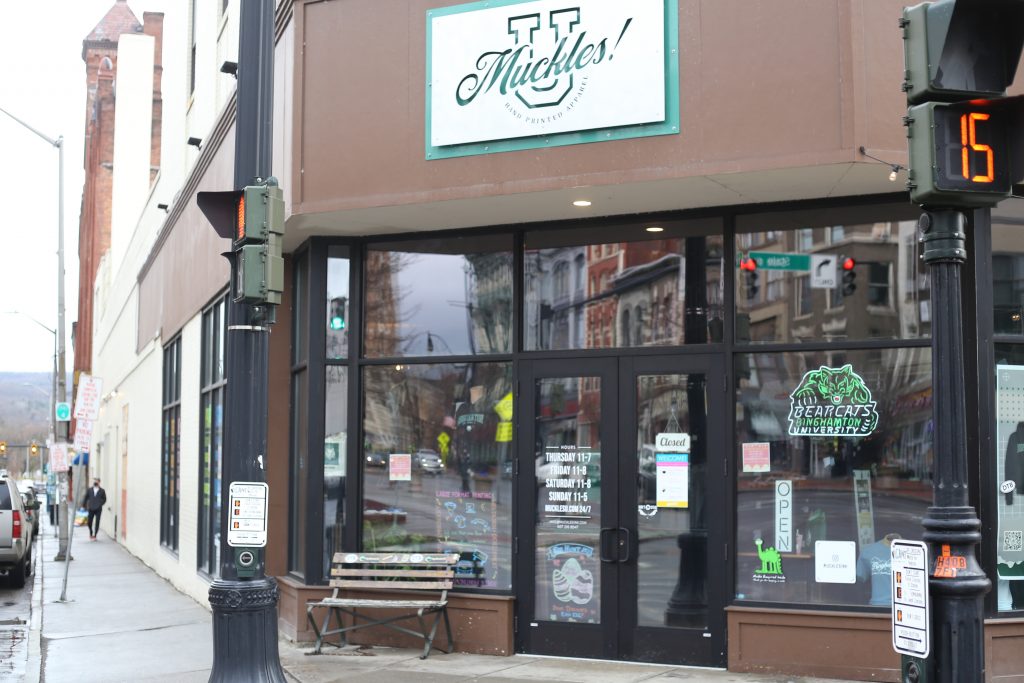A staple of the newly revitalized Downtown Binghamton, Muckles’ Ink on the corner of Court Street and State Street has been printing apparel since 2012. Originally founded independently by Casey Coolbaugh, ‘13, and Chauna D’Angelo, ‘12, Muckles’ Ink has since been acquired by the Binghamton University alumni-run Red Barn Creative Group and is now owned by Jonathan Layish, ‘91, and Dina Layish, ‘92, visiting assistant professor in the School of Management at BU.
Even a brief stop into the Court Street storefront can show off the dozens of Binghamton-themed products the company is printing and selling, from T-shirts and hoodies to sweatpants and hats. Muckles’ Ink is well known throughout the community as the destination for BU apparel, but the team wants it to be even more.
“[We] wanted to create more of a confluence between the community and the University,” Jonathan Layish wrote in an email. “As transplants [from downstate], my wife and I like to see the community embrace the University and vice versa.”
In recent years, beyond the traditional BU branding, Muckles’ Ink has been starting other printing projects as well. Some recent printing projects that have been gaining traction are apparel with nostalgic college logos, back from when BU was known as Harpur College or SUNY Binghamton. On top of the college-themed shirts, Muckles’ Ink is also currently selling a set of “Quarantees,” or T-shirts with pandemic-themed cartoons printed on them. These shirts are also a part of a community fundraiser, with 20 percent of profits going toward supporting local businesses hit by the pandemic. This type of community engagement is what the owners of Muckles’ Ink are trying to shift their focus toward.
“We feel a business needs to be relevant to the community in many ways,” Layish wrote. “As we grew, we became a bit conflicted, because so many of the events we sponsored, consumed products we sold. So, while we wanted to be generous and relevant, we also wanted to be part of the ecosystem.”
This was the original idea behind what has become Muckles Rally, a fundraising program set up by the company with the intent of giving back to the community that’s helped them so much. The program aims to change the traditional transactional relationship between community-owned businesses and Muckles’ Ink in favor of something more mutually beneficial.
“We essentially do all the work, come up with great designs and web-enable it for the entity,” Layish wrote. “We give them 25 percent of gross sales when the fundraiser is done. We love this revenue model, as it provides a healthy realignment of the buyer and seller.”
Notable participants in Muckles Rally so far have been local PTAs, sports leagues, small businesses like Rocky Linux and the Broome County Humane Society. As part of the fundraising, Muckles’ Ink has created a variety of apparel for clients, many of which are posted and advertised online on the company’s Instagram account. Even beyond its own brick-and-mortar location downtown, Muckles’ Ink has been increasingly doing long-distance business online, something the owners are incorporating into their business strategies.
“Currently we have affiliates that do way more business monthly than the retail location,” Layish wrote. “We hope to use the retail location for fundraisers. [We] want to cultivate creativity, and plan to embrace local artisans and artists to show and sell their work at Muckles’ Ink. It is a bit more of a passion project than a pure attempt to make money, but we do feel the money will eventually follow passion.”
Becoming a staple of the city’s community, not just the BU’s, is the main focus of the Muckles’ Ink’s team moving forward. As tough as COVID-19 was for a lot of small, local-owned businesses, it showed the team at Muckles’ Ink that there is a place for a company such as themselves to work as community-builder, propping up their neighbors.
“While, to date, BU has been the primary focus, our goal is to also increase community focus and blur the lines between Binghamton the city and Binghamton the University,” Layish wrote. “[We] want to advocate the ‘upstate’ way of life. We love living upstate, and love Binghamton.”



